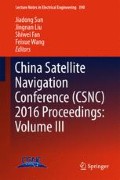Abstract
The real-time acquirement and prediction of high precise clock error is an important foundation in the field of Global Navigation Satellite System (GNSS) real-time precise point positioning and time service. In this paper, GNSS satellite clock error sequence is analyzed in detail, especially for the Beidou Navigation Satellite System, the periodicity characteristic is compared with distinguished types of satellite clock. The sample length of GPS and BDS clock error sequence are analyzed with the method of Polynomial and Periodic model, the result shows that the short-term prediction is better using one-day sequence than two- or three-day sequence. The ARIMA model is optimized with a new fitting method and determining criteria of the order p and q, which is used to the short-term prediction of satellite clock error. And the precision of satellite clock error is analyzed in 1–6 h prediction length, which is compared with the prediction using Polynomial and Periodic method. The results show that the precision has significantly improved, the mostly GPS rubidium clock error prediction precision of 6 h is better than 0.6 ns and 1 h is better than 0.25 ns which has 50 % improved as statistics for a single month. Meanwhile, the BDS satellite clock error prediction precision of 6 h is better than 2 ns and 1 h is better than 1.4 ns which has 30 % improved.
Access this chapter
Tax calculation will be finalised at checkout
Purchases are for personal use only
References
Hofmann-Wellenhof B, Lichtenegger H, Wasle E (2008) GNSS-global navigation satellite systems: GPS, GLONASS, Galileo, and more. Springer Wien New York
Yang YX, Li JL, Xu JY et al (2011) Contribute of the Compass satellite navigation system to global PNT users. Chinese Sci Bull 56. doi:10.1007/s11434-011-4627-4
Gao Y, Chen K (2005) Performance analysis of precise point positioning using rea-time orbit and clock products. J Glob Positioning Syst 3:95–100
Reid W, Meeaskill T, Largay M, Oakso J, Buisson J (2000) Performance of GPS Block IIR Rubidium clocks. IONGPS 2000, Salt Lake City, UT 19–22 Sept 2000
Senir KL, Ray JR, Beard RL (2008) Characterization of periodic variations in the GPS satellite clocks. GPS Solut. doi:10.1007/s10291-008-0089-9
Youn JH, Jeongho C, Moon BH (2010) Improving prediction accuracy of GPS satellite clocks with periodic variation behavior. Meas Sci Technol 21:1–8
Huang G, Zhang Q, Li H, Fu W (2012) Research on quality variation of GPS satellite clocks on-orbit using IGS clock products. Adv Space Res. doi:10.1016/j.asr.2012.09.041
Huang G, Zhang Q, Xu G (2014) Real-time clock offset prediction with an improved model. GPS Solut 18:95–104
Xu X, Hu X, Zhou Y, Song Y (2014) Research on high accuracy prediction model of satellite clock bias. The 5th China Satellite Navigation Conference, vol 5
Fu W (2012) Research on prediction and characteristics of GNSS satellite clock on orbit. Chang’an University
Hauschild A, Montenbruck O, Steigenberger P (2013) Short-term analysis of GNSS clocks. GPS Solution. doi:10.1007/s10291-012-0278-4
Huang G, Yang Y, Zhang Q (2011) Estimate and predict satellite clock error using adaptively robust sequential adjustment with classified adaptive factors based on opening windows. Acta Geodaetica Cartogr Sin 40:15–21
Xu J, Fu S (2001) The application of spectral analysis in curve fit. J Geomatics 3:20–22
Acknowledgments
This study is funded by the National Natural Science Fund (No. 11273048). The IGS is acknowledged for providing the final GPS clock error products. The iGMAS is acknowledged for providing final BDS clock error products.
Author information
Authors and Affiliations
Corresponding author
Editor information
Editors and Affiliations
Rights and permissions
Copyright information
© 2016 Springer Science+Business Media Singapore
About this paper
Cite this paper
Zhou, W., Huang, C., Song, S., Chen, Q., Liu, Z. (2016). Characteristic Analysis and Short-Term Prediction of GPS/BDS Satellite Clock Correction. In: Sun, J., Liu, J., Fan, S., Wang, F. (eds) China Satellite Navigation Conference (CSNC) 2016 Proceedings: Volume III. Lecture Notes in Electrical Engineering, vol 390. Springer, Singapore. https://doi.org/10.1007/978-981-10-0940-2_17
Download citation
DOI: https://doi.org/10.1007/978-981-10-0940-2_17
Published:
Publisher Name: Springer, Singapore
Print ISBN: 978-981-10-0939-6
Online ISBN: 978-981-10-0940-2
eBook Packages: EngineeringEngineering (R0)

